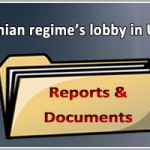An Information Bank About Iranian Regime’s Lobby in US
Jul 26th, 2013 The Iranian regime has forged alliance with numerous organizations in the US to further its political agenda. These organizations are Tehran’s web of influence or, its de facto lobby in the U.S. The Iranian American Forum is launching a new website containing investigative reports and documents about the nature of, and methods used by Tehran’s lobby. We consider this informative collection of significant value that sheds light on one of the most complex and convoluted relations in contemporary politics – namely that of the U.S. and Iran.The Iranian regime has forged alliance with various political, social, religious and cultural organizations in the US to further its political agenda. These organizations constitute a de facto Iranian lobby in the US. The aim of this lobby is to influence Washington’s policy toward Iran, to remove economic sanctions, and relief political pressure from Tehran’s rulers. Chief among these Iran friendly organizations are US oil corporations.
The Iranian regime has forged alliance with numerous organizations in the US to further its political agenda. These organizations are Tehran’s web of influence or, its de facto lobby in the U.S. The Iranian American Forum is launching a new website containing investigative reports and documents about the nature of, and methods used by Tehran’s lobby. We consider this informative collection of significant value that sheds light on one of the most complex and convoluted relations in contemporary politics – namely that of the U.S. and Iran.The Iranian regime has forged alliance with various political, social, religious and cultural organizations in the US to further its political agenda. These organizations constitute a de facto Iranian lobby in the US. The aim of this lobby is to influence Washington’s policy toward Iran, to remove economic sanctions, and relief political pressure from Tehran’s rulers. Chief among these Iran friendly organizations are US oil corporations.
The beginning of this lobby goes back to 1997 when the so-called reformist Mohammad Khatami became Iran’s president and launched a charm offensive to soften Western attitudes toward Iran. The American business interests grasped this golden opportunity. The National Foreign Trade Council (NFTC), representing numerous American large corporations, created a lobbying arm called USA*Engage to change the US policy against Iran, and to remove sanctions. But there was a missing element in this disgraceful equation.
To bolster its legitimacy and credibility, the newly formed lobby needed the support and participation of Iranian-American organizations in order to give the anti-sanction lobby a human face. Ironically, the desire to have a friendly “Iranian voice” in Washington was shared by Iran’s rulers. This odd alliance with the shared goal of removing economic sanction was the driving force that facilitated creation and sustenance of several Iranian-American organizations. These organizations became the “Iranian Voice” that sang to the tune of Tehran and the US trade lobby. Noteworthy examples are the American Iranian Council (AIC) (founded in 1997 by Houshang Amirahmadi) and the National Iranian American Council – NIAC (founded in 2002 by Trita Parsi).
In addition to trade lobby and its affiliated Iranian American organizations, Tehran has been able to form close alliances with some factions of the antiwar movement in US. Following the US invasion of Iraq in 2003, anti-war movement and opposition to George Bush’s policy in the Middle East gained momentum in the US. With intensified disputes between US and Iran (mainly due to Iran’s nuclear activities and regional expansionism) antiwar movement, fearing a new war in the region, grew more suspicious and critical of the Washington. On the other hand the opportunistic Iranian regime and its American proxies and allies detected a unique opening to ride this popular movement in order to advance their political agenda. The unholy alliance of trade lobby and Tehran has effectively turned factions of the antiwar movement into an important part of anti-sanction and pro-Tehran lobby.

